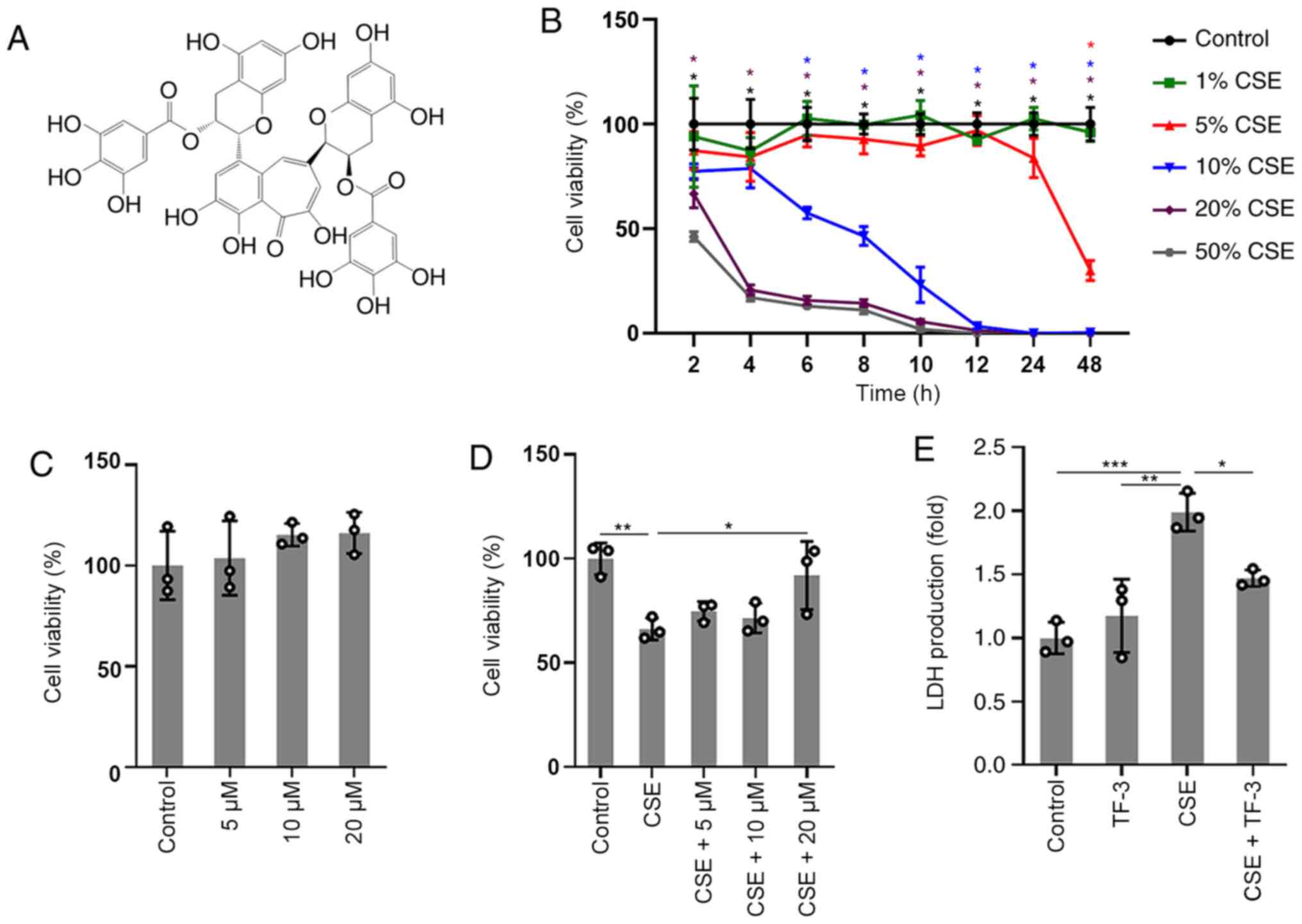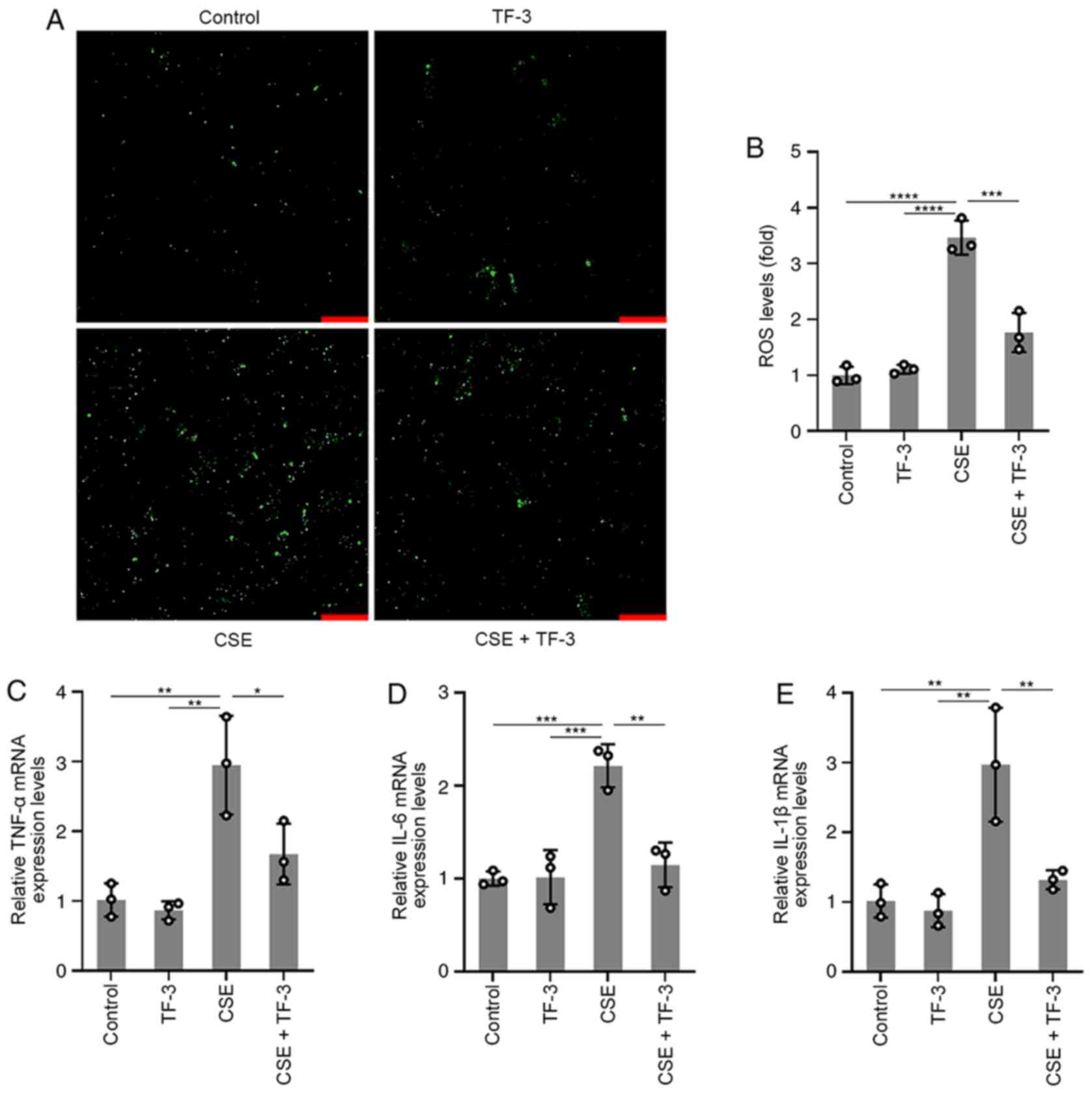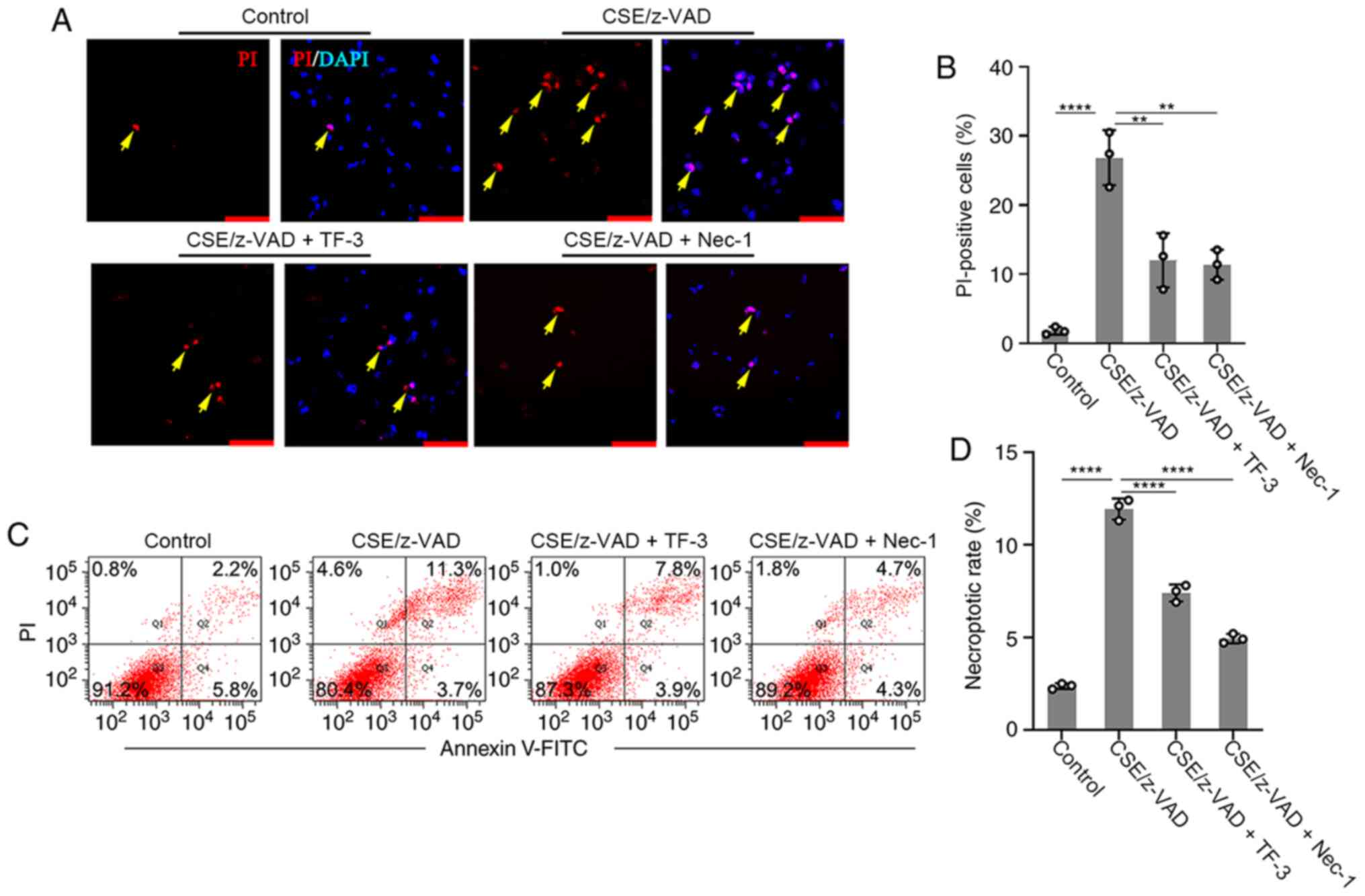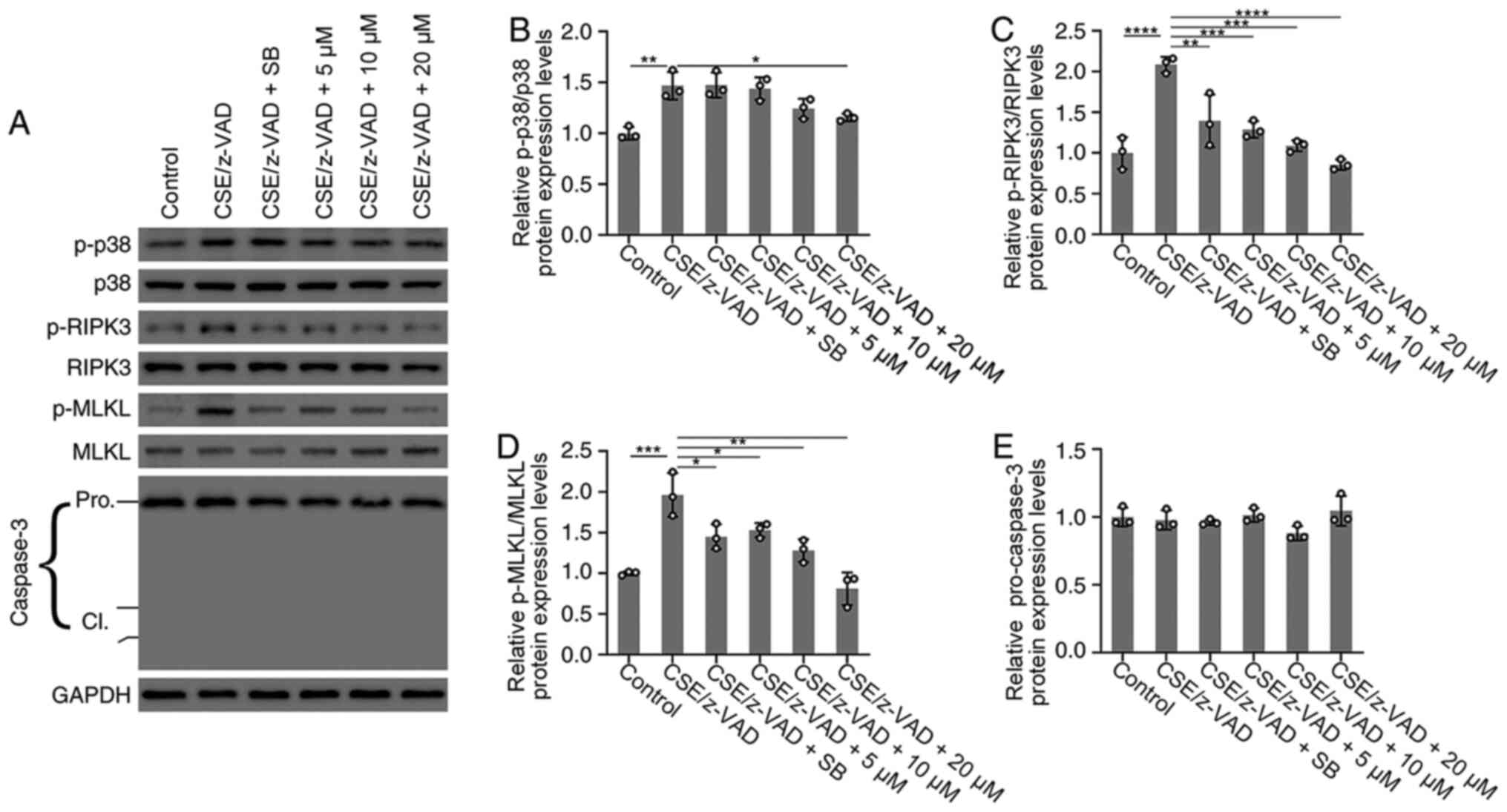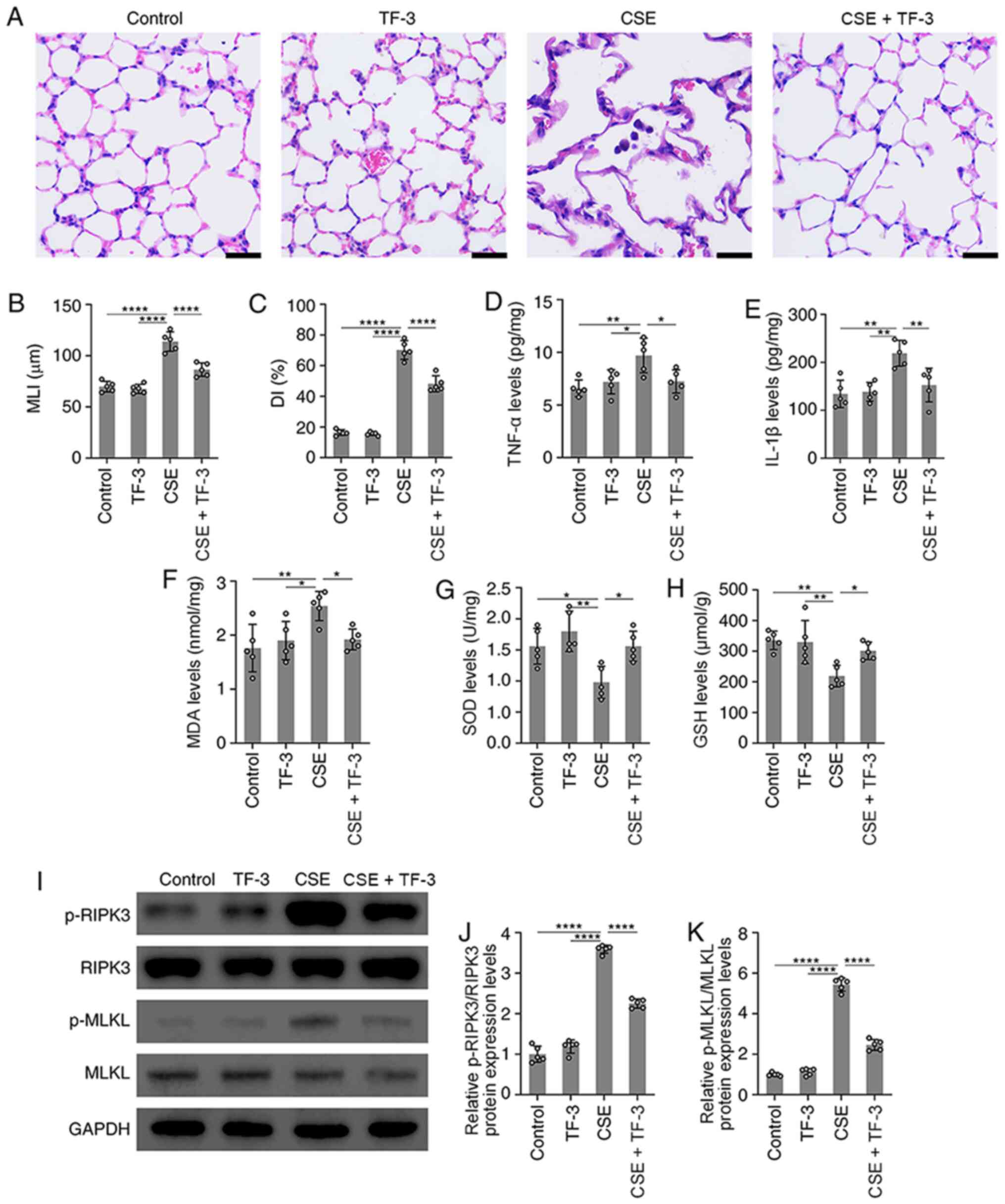|
1
|
Labaki WW and Rosenberg SR: Chronic
obstructive pulmonary disease. Ann Intern Med. 173:ITC17–ITC32.
2020.PubMed/NCBI View Article : Google Scholar
|
|
2
|
Tuder RM, Yoshida T, Arap W, Pasqualini R
and Petrache I: State of the art. Cellular and molecular mechanisms
of alveolar destruction in emphysema: An evolutionary perspective.
Proc Am Thorac Soc. 3:503–510. 2006.PubMed/NCBI View Article : Google Scholar
|
|
3
|
Bedoui S, Herold MJ and Strasser A:
Emerging connectivity of programmed cell death pathways and its
physiological implications. Nat Rev Mol Cell Biol. 21:678–695.
2020.PubMed/NCBI View Article : Google Scholar
|
|
4
|
Mizumura K, Cloonan SM, Nakahira K,
Bhashyam AR, Cervo M, Kitada T, Glass K, Owen CA, Mahmood A, Washko
GR, et al: Mitophagy-dependent necroptosis contributes to the
pathogenesis of COPD. J Clin Invest. 124:3987–4003. 2014.PubMed/NCBI View
Article : Google Scholar
|
|
5
|
Balentine DA, Wiseman SA and Bouwens LC:
The chemistry of tea flavonoids. Crit Rev Food Sci Nutr.
37:693–704. 1997.PubMed/NCBI View Article : Google Scholar
|
|
6
|
Ukil A, Maity S and Das PK: Protection
from experimental colitis by theaflavin-3,3'-digallate correlates
with inhibition of IKK and NF-kappaB activation. Br J Pharmacol.
149:121–131. 2006.PubMed/NCBI View Article : Google Scholar
|
|
7
|
Wu Y, Jin F and Wang Y, Li F, Wang L, Wang
Q, Ren Z and Wang Y: In vitro and in vivo anti-inflammatory effects
of theaflavin-3,3'-digallate on lipopolysaccharide-induced
inflammation. Eur J Pharmacol. 794:52–60. 2017.PubMed/NCBI View Article : Google Scholar
|
|
8
|
Ai Z, Wu Y, Yu M, Li J and Li S:
Theaflavin-3, 3'-digallate suppresses RANKL-induced
osteoclastogenesis and attenuates ovariectomy-induced bone loss in
mice. Front Pharmacol. 11(803)2020.PubMed/NCBI View Article : Google Scholar
|
|
9
|
Pan H, Kim E, Rankin GO, Rojanasakul Y, Tu
Y and Chen YC: Theaflavin-3, 3'-digallate inhibits ovarian cancer
stem cells via suppressing Wnt/β-Catenin signaling pathway. J Funct
Foods. 50:1–7. 2018.PubMed/NCBI View Article : Google Scholar
|
|
10
|
Council NR: Guide for the Care and Use of
Laboratory Animals: Eighth Edition. Washington, DC, The National
Academies Press, 246, 2011.
|
|
11
|
Chen Y, Hanaoka M, Chen P, Droma Y,
Voelkel NF and Kubo K: Protective effect of beraprost sodium, a
stable prostacyclin analog, in the development of cigarette smoke
extract-induced emphysema. Am J Physiol Lung Cell Mol Physiol.
296:L648–L56. 2009.PubMed/NCBI View Article : Google Scholar
|
|
12
|
Sun L, Wang H, Wang Z, He S, Chen S, Liao
D, Wang L, Yan J, Liu W, Lei X and Wang X: Mixed lineage kinase
domain-like protein mediates necrosis signaling downstream of RIP3
kinase. Cell. 148:213–227. 2012.PubMed/NCBI View Article : Google Scholar
|
|
13
|
Sun W, Wu X, Gao H, Yu J, Zhao W, Lu JJ,
Wang J, Du G and Chen X: Cytosolic calcium mediates RIP1/RIP3
complex-dependent necroptosis through JNK activation and
mitochondrial ROS production in human colon cancer cells. Free
Radic Biol Med. 108:433–444. 2017.PubMed/NCBI View Article : Google Scholar
|
|
14
|
Cabrera J, Negrín G, Estévez F, Loro J,
Reiter RJ and Quintana J: Melatonin decreases cell proliferation
and induces melanogenesis in human melanoma SK-MEL-1 cells. J
Pineal Res. 49:45–54. 2010.PubMed/NCBI View Article : Google Scholar
|
|
15
|
Livak KJ and Schmittgen TD: Analysis of
relative gene expression data using real-time quantitative PCR and
the 2(-Delta Delta C(T)) method. Methods. 25:402–408.
2001.PubMed/NCBI View Article : Google Scholar
|
|
16
|
Kilkenny C, Browne WJ, Cuthi I, Emerson M
and Altman DG: Improving bioscience research reporting: The ARRIVE
guidelines for reporting animal research. PLoS Biol.
8(e1000412)2010.PubMed/NCBI View Article : Google Scholar
|
|
17
|
Zhang Y, Cao J, Chen Y, Chen P, Peng H,
Cai S, Luo H and Wu SJ: Intraperitoneal injection of cigarette
smoke extract induced emphysema, and injury of cardiac and skeletal
muscles in BALB/C mice. Exp Lung Res. 39:18–31. 2013.PubMed/NCBI View Article : Google Scholar
|
|
18
|
Bahramsoltani R, Ebrahimi F, Farzaei MH,
Baratpourmoghaddam A, Ahmadi P, Rostamiasrabadi P, Rasouli
Amirabadi AH and Rahimi R: Dietary polyphenols for atherosclerosis:
A comprehensive review and future perspectives. Crit Rev Food Sci
Nutr. 59:114–132. 2019.PubMed/NCBI View Article : Google Scholar
|
|
19
|
Tuder RM and Petrache I: Pathogenesis of
chronic obstructive pulmonary disease. J Clin Invest.
122:2749–2755. 2012.PubMed/NCBI View
Article : Google Scholar
|
|
20
|
Polverino F, Rojas-Quintero J, Wang X,
Petersen H, Zhang L, Gai X, Higham A, Zhang D, Gupta K, Rout A, et
al: A disintegrin and metalloproteinase Domain-8: A novel
protective proteinase in chronic obstructive pulmonary disease. Am
J Respir Crit Care Med. 198:1254–1267. 2018.PubMed/NCBI View Article : Google Scholar
|
|
21
|
Yang CS, Kim JJ, Lee SJ, Hwang JH, Lee CH,
Lee MS and Jo EK: TLR3-triggered reactive oxygen species contribute
to inflammatory responses by activating signal transducer and
activator of transcription-1. J Immunol. 190:6368–6377.
2013.PubMed/NCBI View Article : Google Scholar
|
|
22
|
Martinon F: Signaling by ROS drives
inflammasome activation. Eur J Immunol. 40:616–619. 2010.PubMed/NCBI View Article : Google Scholar
|
|
23
|
Galluzzi L, Kepp O, Chan FK and Kroemer G:
Necroptosis: Mechanisms and relevance to disease. Annu Rev Pathol.
12:103–130. 2017.PubMed/NCBI View Article : Google Scholar
|
|
24
|
Pearson JS, Giogha C, Mühlen S, Nachbur U,
Pham CL, Zhang Y, Hildebrand JM, Oates CV, Lung TW, Ingle D, et al:
EspL is a bacterial cysteine protease effector that cleaves RHIM
proteins to block necroptosis and inflammation. Nat Microbiol.
2(16258)2017.PubMed/NCBI View Article : Google Scholar
|
|
25
|
Wang Y, Liu J, Zhou JS, Huang HQ, Li ZY,
Xu XC, Lai TW, Hu Y, Zhou HB, Chen HP, et al: MTOR suppresses
cigarette smoke-induced epithelial cell death and airway
inflammation in chronic obstructive pulmonary disease. J Immunol.
200:2571–2580. 2018.PubMed/NCBI View Article : Google Scholar
|
|
26
|
Ryter SW, Rosas IO, Owen CA, Martinez FJ,
Choi ME, Lee CG, Elias JA and Choi AMK: Mitochondrial Dysfunction
as a pathogenic mediator of chronic obstructive pulmonary disease
and idiopathic pulmonary fibrosis. Ann Am Thorac Soc. 15 (Suppl
4):S266–S272. 2018.PubMed/NCBI View Article : Google Scholar
|
|
27
|
Newton K and Manning G: Necroptosis and
Inflammation. Annu Rev Biochem. 85:743–763. 2016.PubMed/NCBI View Article : Google Scholar
|
|
28
|
Weinlich R, Oberst A, Beere HM and Green
DR: Necroptosis in development, inflammation and disease. Nat Rev
Mol Cell Biol. 18:127–136. 2017.PubMed/NCBI View Article : Google Scholar
|
|
29
|
Sullivan AK, Simonian PL, Falta MT,
Cosgrove GP, Brown KK, Kotzin BL, Voelkel NF and Fontenot AP:
Activated oligoclonal CD4+ T cells in the lungs of patients with
severe emphysema. Proc Am Thorac Soc. 3(486)2006.PubMed/NCBI View Article : Google Scholar
|















